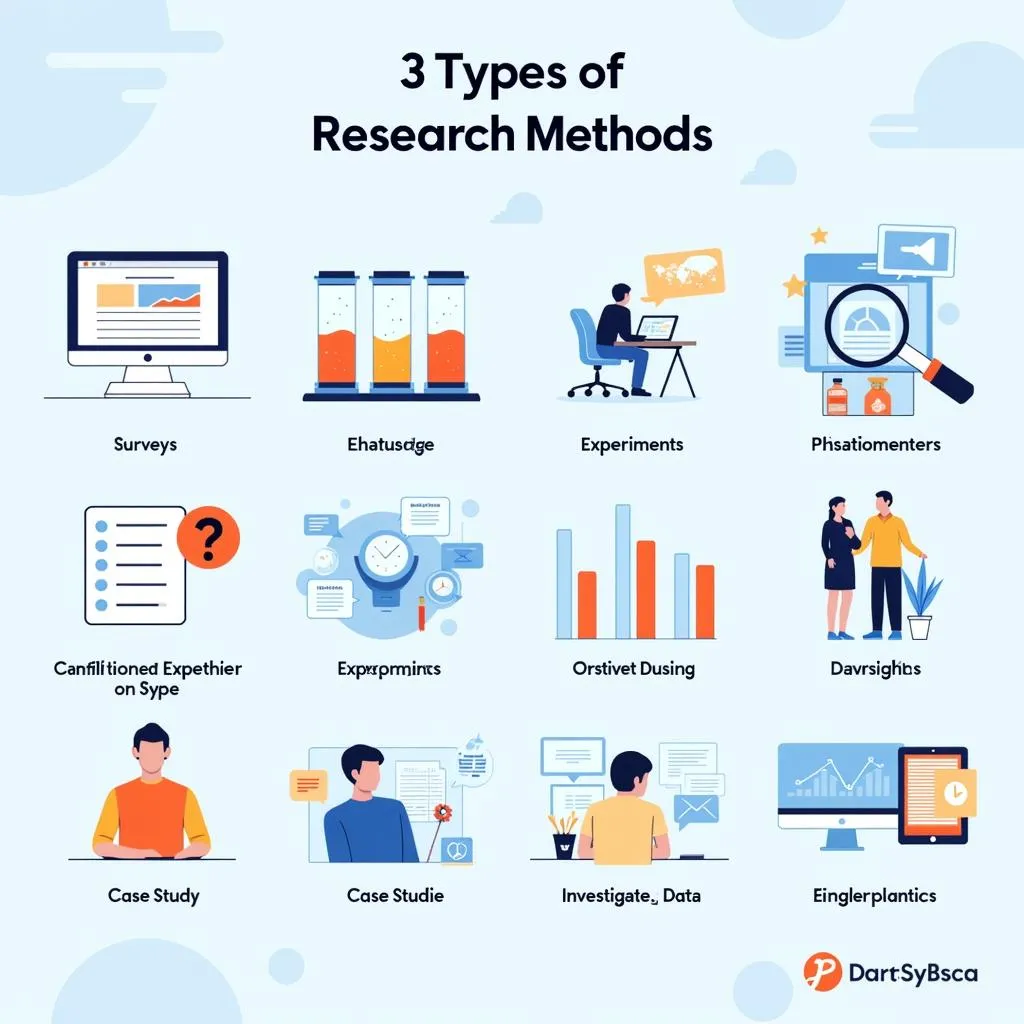Research methodology refers to the systematic approach and techniques used by researchers to conduct a study and ensure the validity, reliability, and accuracy of their findings. It encompasses the entire research process, from defining the research question to collecting, analyzing, and interpreting data. Choosing the right research methodology is crucial for the success of any study, as it determines the tools, techniques, and procedures that researchers will employ.
 Types of Research Methodology
Types of Research Methodology
Quantitative Research Methodology: Measuring the Measurable
Quantitative research methodology focuses on collecting and analyzing numerical data to establish patterns, relationships, and trends. It aims to quantify the extent of a phenomenon, test hypotheses, and make predictions. Quantitative research methods are often employed when researchers want to obtain objective and generalizable findings. Some common types of quantitative research methods include:
- Surveys: Gathering information from a sample population through questionnaires or structured interviews.
- Experiments: Manipulating variables in a controlled environment to determine cause-and-effect relationships.
- Statistical Analysis: Using mathematical and statistical techniques to analyze numerical data and draw inferences.
For instance, a Wasatch Clinical Research study might employ quantitative methods to investigate the prevalence of reported paranormal experiences in a specific geographical area. By surveying a large sample size and analyzing the data statistically, researchers can identify patterns and draw conclusions about the frequency and nature of such occurrences.
Qualitative Research Methodology: Exploring the Nuances of Human Experience
Qualitative research methodology, in contrast to quantitative methods, delves into the complexities of human behavior, experiences, and social phenomena. It aims to gain an in-depth understanding of subjective experiences, meanings, and perspectives. Qualitative research often involves collecting and analyzing non-numerical data, such as text documents, audio recordings, and videos. Some common types of qualitative research methods include:
- Interviews: Conducting in-depth conversations with individuals to gather rich and detailed information.
- Focus Groups: Facilitating discussions among a group of people to explore shared experiences and perspectives.
- Ethnography: Immersing oneself in a particular culture or group to observe and understand their behavior and beliefs.
In the context of Paranormal Research, qualitative methods could be used to explore the personal experiences and interpretations of individuals who claim to have encountered paranormal phenomena. By conducting in-depth interviews and analyzing the narratives, researchers can gain insights into the subjective meaning-making processes associated with such experiences.
 Qualitative Research Methods
Qualitative Research Methods
Mixed Methods Research: Combining the Best of Both Worlds
As the name suggests, mixed methods research integrates both quantitative and qualitative research approaches. By combining the strengths of both methodologies, researchers can gain a more comprehensive understanding of the research problem. This approach allows for a more nuanced exploration of complex phenomena by collecting and analyzing both numerical and non-numerical data. For example, a mixed-methods study on paranormal phenomena might involve collecting quantitative data on the frequency of reported experiences in a particular location while also conducting qualitative interviews with individuals who claim to have had such experiences to understand their personal interpretations and the impact of these events on their lives.
Choosing the Right Methodology: A Critical Decision
Selecting the appropriate research methodology is paramount for any study’s success. The choice of methodology should align with the research question, objectives, and the nature of the phenomenon under investigation.
Consider the strengths and limitations of each research methodology. Quantitative methods excel at providing statistically significant data and identifying patterns, while qualitative methods provide rich, contextualized insights into human experiences and perspectives. The choice of the most suitable methodology depends on the specific research question and the type of data that will best answer it.
Frequently Asked Questions about Research Methodology
1. What is the difference between research methods and research methodology?
Research methods are specific tools and techniques used to collect and analyze data, while research methodology refers to the overall approach and framework guiding the entire research process.
2. Can I use multiple research methods in a single study?
Yes, using multiple research methods, also known as triangulation, can strengthen the validity and reliability of findings by providing multiple perspectives on the research problem.
3. What are some common challenges in research methodology?
Common challenges include ensuring ethical considerations, selecting appropriate sample sizes, minimizing bias, and ensuring the reliability and validity of data collection and analysis methods.
4. How do I choose the right research methodology for my study?
Choosing the right research methodology depends on the research question, objectives, available resources, and the nature of the phenomenon being investigated. Consult with experienced researchers and review relevant literature to determine the most appropriate approach.
5. What are the ethical considerations in research methodology?
Ethical considerations in research include obtaining informed consent from participants, ensuring privacy and confidentiality, minimizing risks to participants, and maintaining objectivity and integrity throughout the research process.
Need Help with Your Research?
If you’re embarking on a research project and need guidance on selecting the right methodology or conducting your study, our team of experienced researchers at National Opinion Research Center is here to help! Contact us at 0904826292, email us at research@gmail.com, or visit us at No. 31, Alley 142/7, P. Phú Viên, Bồ Đề, Long Biên, Hà Nội, Việt Nam. Our 24/7 customer support team is ready to assist you!
We also invite you to explore our other insightful articles on clinical research and training and delve into the fascinating world of research methodology in social work. For those intrigued by the possibilities of fieldwork, our piece on Lustrous Odyssey Field Research offers a captivating glimpse into this hands-on approach.